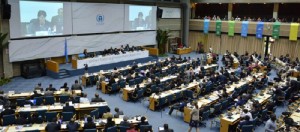 “The air we breathe, the water we drink and the soil that grows our food are part of a delicate ecosystem that is increasingly under pressure,” said UN Secretary General Ban Ki-moon at the closing session of the inaugural UN Environment Assembly (UNEA) which concluded its five-day deliberations in Nairobi recently “We need to act decisively to change humanity’s relationship with our planet.”
“The air we breathe, the water we drink and the soil that grows our food are part of a delicate ecosystem that is increasingly under pressure,” said UN Secretary General Ban Ki-moon at the closing session of the inaugural UN Environment Assembly (UNEA) which concluded its five-day deliberations in Nairobi recently “We need to act decisively to change humanity’s relationship with our planet.”
“This is just the beginning. Change is in the air. Solutions exist,” he added. “We are now poised for the crucial next phase of human development,” he said.
The assembly adopted 16 decisions and resolutions that encourage international action on major environmental issues ranging from air pollution and the illegal trade in wildlife, to plastic debris in the oceans, chemicals and waste.
Air pollution, responsible for 7 million deaths annually, according to estimates by the World Health Organization (WHO), was identified as a top issue that requires immediate action by the international community.
According to a report by UNEP and INTERPOL titled The Environmental Crime Crisis, released during UNEA, global environmental crime is worth up to US $213 billion each year and is helping to finance criminal, militia and terrorist groups and threatening the security and sustainable development of many nations.
According to new reports launched by UNEP and partners at UNEA, there is growing concern over the threat that widespread plastic waste poses to marine life, with conservative estimates of the overall financial damage of plastics to marine ecosystems standing at US $13 billion each year.
For a full report on the assembly visit the UNEP website.